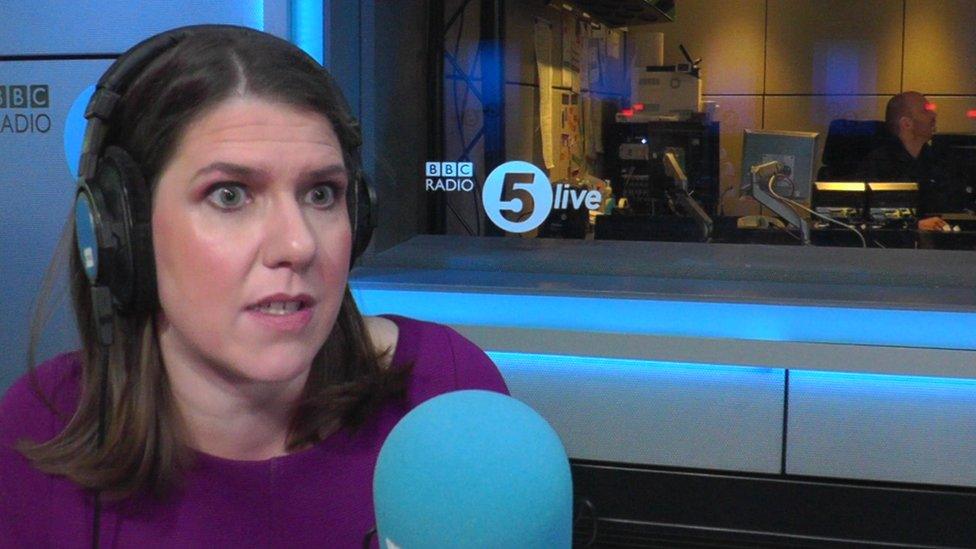General election 2019: Jo Swinson defends stance on transgender rights
- Published

Jo Swinson has defended her support for plans to make it easier for people to legally change gender, saying it will address transgender "demonisation".
The Lib Dems want to change the law to automatically recognise non-binary gender identities and allow people to self-identify without medical evidence.
This would stop the "marginalisation" of already vulnerable people, she said.
Asked whether she believed all people were born either male or female, she replied: "Not from what I have read."
"I am not going to pretend I'm an expert on the subject but I don't think things are as binary as they are often presented," she told Radio 4's Today programme.
While Ms Swinson accepted most people's biological sex was determined at birth, she said this was not always the case. And, she added, this was not purely about science but was a "debate about people and their lives and a debate about people who are facing extreme prejudice".
The Lib Dems have said the next government needs to be much more pro-active in tackling discrimination and hate crimes, the rise in which they claim has left many people "no longer feeling safe".
In their manifesto, they pledge to reform the 2004 Gender Recognition Act, legislation which allows transgender people to legally change their gender and obtain official recognition of their acquired gender.
They want to make its easier for applicants to obtain a gender recognition certificate, by removing the requirement for them to provide two medical reports, one showing a diagnosis of "gender dysphoria" and the other outlining details of treatment received.
They would also scrap the £140 application fee and the need for married applicants to get the consent of their spouse. The party says it would introduce an "X" gender option on passports and extend equality law to cover gender identity and expression.
'Marginalised'
Critics of the Lib Dems plan to reform the Gender Recognition Act, including some women's rights groups and Christian organisations, have warned that it will make it easier for someone born as a man but now identifying as a women to gain access to women-only spaces such as toilets, changing rooms, prisons and women's refuges.
Woman's Place UK, which campaigns against discrimination against women, says any changes must be subject to an Equality Impact Assessment to ensure they do not infringe the rights of others, especially those with legally protected characteristics under the 2010 Equality Act.
Ms Swinson was challenged on the issue during a BBC Radio 5 Live election phone-in, when she was asked by a caller to say "what a woman is".
The Lib Dem leader said she believed people could "understand their own identity" and it was right, in terms of the law, "for them" to define it.
Gender self-identification largely existed at the moment, she said, and her party's proposed changes would "formalise" this and "remove existing barriers that end up creating discrimination on a very vulnerable group of people".
She said women needed protection from those acting in a predatory or anti-social way. But she did not want to get to a place where women had to have swipe cards to access female changing rooms in leisure facilities or there had to be some public "inspections" of gender.
During her Today interview, she said that while she was a feminist she did not believe in "some hierarchy of equality".
"Implicit in all of this is an assumption that trans women are, in some way, more likely to be violent. It is just not borne out. I think there is a demonisation of a community going on here and I often find the media is complicit in that."
What are the other parties proposing?
Labour says it is also committed to reforming the 2004 Act, which it introduced, to introduce self-declaration for transgender people.
It is promising to take action to eliminate remaining areas of discrimination in the law, including mandatory LGBT+ inclusive relationships and sex education lessons in school.
There is no specific mention of the Gender Recognition Act in the Conservative manifesto. The party says it is committed to "vigorously combating" harassment and violence against LGBT people and hosting the UK government's first ever LGBT international conference.
The Green Party also want to update the act and remove the "spousal veto".

CONFUSED? Our simple election guide, external
POLICY GUIDE: Who should I vote for?, external
BREXIT: Where do the parties stand?
